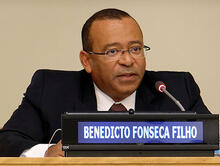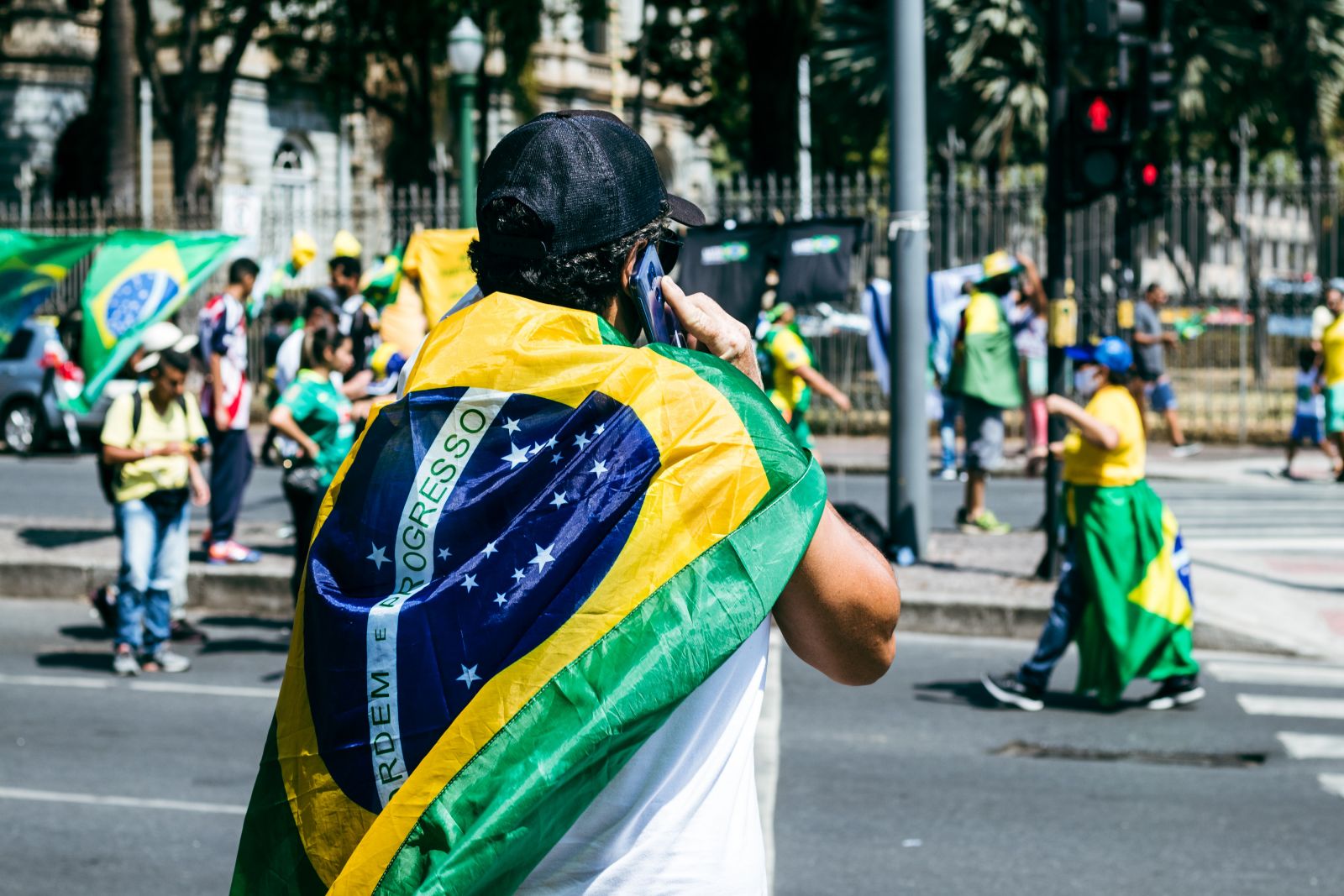Bringing Diversity to Diplomacy: Interview with Ambassador Benedicto Fonseca Filho, Consul General of Brazil in Boston

On September 24th, Ambassador Benedicto Fonseca Filho visited the Yale MacMillan Center to attend the conference “The Road Ahead, Brazil 100/200.” Fonseca Filho, recently appointed as the new Brazilian Ambassador in South Africa, has been serving as the Consul General in Boston. In this interview with CLAIS, Fonseca Filho talks about his trajectory as one of the first Black diplomats in his country, and the challenges related to diversity in the Brazilian foreign service.
When did you become interested in diplomacy and why?
When I was very young. My father was a public servant of Itamaraty, the Ministry of Foreign Affairs. He was set in Prague from 1972 to 1975, when I was between 9 and 12 years old. This gave me an opportunity to travel abroad, get to know other cultures, and learn what diplomacy was. From that time I wanted to become a diplomat. In Prague, I learned English and French. I continued studying when my dad and I came back to Brazil.
“Being of Black origin, and coming from a family without traditional roots in Itamaraty has shaped me. My father was a humble public servant. He took care of the place, locked doors, made sure everything run well — in Portuguese his role was agente de portaria, like a porter”
In college, I studied International Relations because I was already convinced that I wanted to become a diplomat. In 1981 I entered the University of Brazil, and in 1985, I took the diplomacy entry exam for Rio Branco and was approved. At the time, there was a three year process to establish the final cohort of diplomats. In each year, you got ranked according to your performance. I was second place in the entry exam, second in the second year, and second in the third year as well. So overall, I was very highly ranked.
I started in Washington, where I did training that everyone had to do. Then in Paris, where I did a study trip at the Sorbonne. After that, I travelled as a diplomat. First, I was posted in Argentina. From there, I went to Israel. Then I came back to Brazil for a number of years, working with environmental issues. After some years, I went to New York to the permanent mission in the United States. Then I stayed in Brazil from 2007 to 2018 and I was promoted to ambassadorship in 2010 but I stayed 8 more years as the director of the Department of Science and Technology. At the end of 2018, I was moved to Boston, where I am now.
What has been one of the biggest challenges of representing Brazil abroad?
Until now, I have not been the head of mission in an embassy. It’s different because at the consulate our focus is the Brazilian community. I am not dealing with political issues as a consul in Boston. However, in a few weeks, I will begin working as ambassador to South Africa, after being approved by Congress in Brazil.
Despite that, I do see some challenges. One of them is maintaining credibility, because once you lose it, you lose all access to resources. Another is making sure to convey a positive image of your country and explore positive possibilities. Of course, there will always be issues and problems, but, as we say in Itamaraty, you have to always explore the positive agenda, and also always keep in mind to have a very clear aim to defend your country’s interests in all spheres.

What diplomatic priorities does Brazil have at the moment, in particular with the United States?
As Foreign Affairs, we have some issues of permanent interest that do not change with circumstances. For instance, there is a permanent interest in exploring to the fullest extent the possibilities of cooperation in trade and in science and technology, also to have in place mechanisms to assist the population that is migrating.
How does your personal experience reflect in your approach to diplomacy?
Being of Black origin, and having come from a family that does not have traditional roots in Itamaraty has shaped me. My father was a humble public servant. He was the person in charge of taking care of the place, lock doors, making sure everything is running well — in Portuguese his role was agente de portaria, like a porter. Even though he was not a diplomat, he made a very good impression. I hear from colleagues that my father was someone who reflected the spirit that they have in Itamaraty of feeling that they belong to something greater. Unfortunately, jobs like my father’s have been lost because now many of his functions are outsourced to companies. For example, our mission does not have Brazilian guardians or porters because there is a company that takes care of security. There is not this aura of something magic that existed before anymore. But in general, knowing my roots and heritage allows me to have a more nuanced vision, and take into account aspects that maybe people with other experiences would overlook. I try to have a more encompassing view, trying to see the overall picture, including those areas of interest to minorities and to people that are also in more humble positions.
“The day I entered Itamaraty, the main newspaper in Brazil front page said “woman and black, first places in diplomacy exam.” In 1985, it was considered out of the ordinary that a woman and a black person would be placed first to enter one of the most elite institutions in Brazil”
Speaking of diversity, what is one of the biggest challenges to increasing diversity in diplomatic careers?
In the last ten years, Itamaraty has been complying with a law that mandates that 20% of diplomatic places must be filled by Black people. So in the last ten years there has been an increase in the number of Black diplomats. In my time, back in 1985, there were no quotas. It was very rare to see people of color there. Indeed, the day I entered Itamaraty, the main newspaper in Brazil had a front page that said “woman and black, first places in diplomacy exam.” In 1985, it was considered out of the ordinary that a woman and a black person would be placed first to enter Itamaraty, which is one of the most elite institutions in Brazil. And then in 2010, it was also considered out of the ordinary that a Black person would become a career ambassador. But in 2010, there were already ambassador women in important positions like Geneva and Berlin. So these minority-centered concerns are important, but sometime they move in different paces. In fact, my class, that graduated in 1987, is called Guimarães Rossa, in memory of the writer and diplomat who we chose to honor because out of the 21 students in my class, three are people of Black origins, and all three of us are ambassadors now, which shows that it was a very successful class: I will become an ambassador in South Africa; my colleague Flávio Damico is now ambassador for disarmament issues in Geneva; and my colleague Silvio Albuquerque, who was a consul in Vancouver, is now the ambassador in Kenya, in Nairobi.
What project are you working on at the moment as consul in Boston?
We are now totally focused on the preparation for elections. We organize elections abroad, but only for president. And we have to provide all the logistics for them. We have just received the electronic voting machines, so it is our challenge to make sure we lay down all the structure. In Boston, we have a large community of Brazilian nationals. We estimate that there are around four hundred thousand. We have the third largest electoral cohort outside of Brazil. The first is Lisbon, the second Miami. So it will be a big operation for us.
We also recently finished celebrations of the bicentennial independence, which also took place this year. Yale is having an event to celebrate that too. We organized events in ten cities around Massachussets, and one in New Hampshire. We had flag raising ceremonies and festivities. It made me very happy to see the communities engaged.
By Alan Mendoza Sosa, CLAIS Graduate Communications Fellow, alan.mendozasosa@yale.edu
